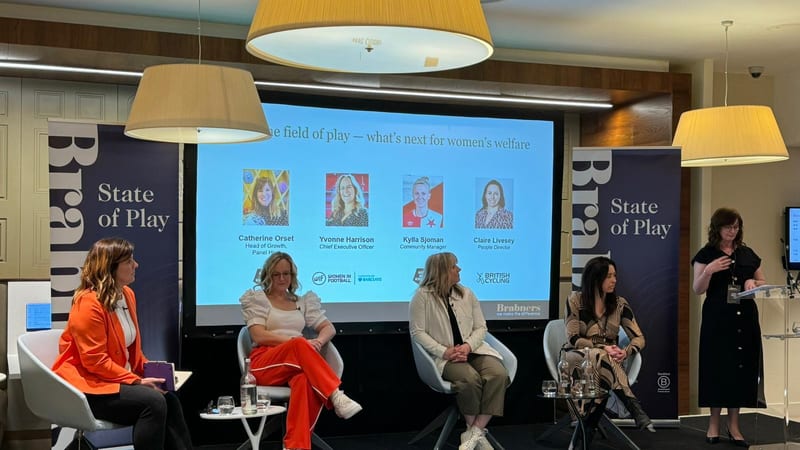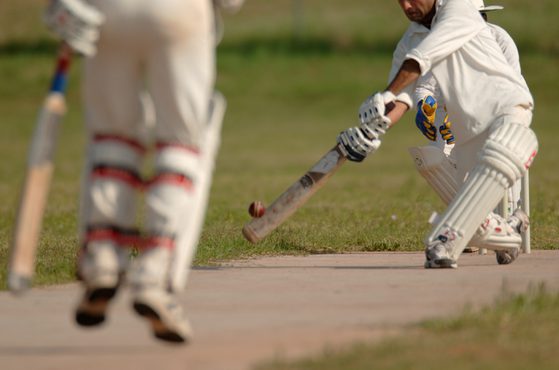Sport’s duty of care
Our first panel session explored the scope of the duty of care that sport owes to athletes.
The session was hosted by Catherine Forshaw (Brabners), who was joined by Steven Flynn (legal counsel), Jon Dutton OBE (British Cycling) and Josh Rudd (British Swimming).
The key themes involved discussing what the ‘duty of care’ is from both the legal and athlete perspective, as well as what sports teams can do to better support their athletes.
In the legal sphere, duty of care derives from the law of Tort. Essentially, the law places a duty on individuals to take reasonable care to avoid careless acts that could foreseeably harm others.
From an employer’s perspective, the duty of care is more akin to a moralistic obligation that requires individuals to look out for an athlete’s best interests. Clearly, there’s a marked difference between the law’s interpretation of ‘duty of care’ and that of athletes, employers and governing bodies. As the panel noted, this could lead to a conflict between what the athlete thinks that their club or team should be doing to support them and what the employer is actually obligated to do.
If a dispute were to arise, we recommend speaking to a lawyer to understand what the key concerns are and aim to use alternative dispute resolution to ensure that the disagreement can be resolved as quickly and amicably as possible.
There was an insightful discussion around media obligations and how clubs can help to prepare athletes for fulfilling such obligations. The panel had an interesting discussion about the level of training and preparation required to make sure that athletes are ‘camera ready’, even after a disappointing result. This could include making sure that they are ‘mentally fit’ to withstand any scrutiny. The Premier League has placed greater emphasis on mental health considerations and our panel discussed the impact that the media has on players generally.
The ‘welfare vs winning’ panel debate introduced a number of legally grey areas that athletes and sports teams should consider — including employment obligations and contracts. Having well-drafted and clear employment contracts at the very start can assist with reducing confusion down the line.
There’s also the obligation on employers and those who run sports teams to consider their equality, diversity and inclusion policies. As society is adapting and changing, it’s essential to support athletes by having the right EDI policies in place. Not only is this better for athletes, it can help to prevent reputational damage and discrimination claims.
Safeguarding is another huge consideration in the sporting world — especially given the young ages at which many athletes join professional teams and the intense pressure and scrutiny they’re placed under. Darts star Luke Littler is just one case in point around the dangers that young sportspeople can face if they aren’t properly safeguarded.
More to be done on mental health
A panel session hosted by our own Andrew McGregor — a trusted advisor to many high-profile clients in the football market, including elite players — focused on the subject of mental health. Andrew was joined by Kofi Josephs (elite professional basketball player and mental health advocate), Michael Caulfield (renowned sports psychologist) and Gerry McCory (captain of Northampton Saints’ wheelchair rugby team, public speaker and psychotherapist).
While we have come a long way in terms of the mental health and wellbeing support offered to athletes, it’s clear that more can be done. The subject is no longer taboo and many athletes have improved access to mental health resources. However, athlete wellbeing is yet to become the top priority in most sports. This is especially unfortunate when you consider its direct impact on training and performance.
The panel felt that most organisations and clubs continue to use mental health professionals in a reactive (rather than a proactive) way. This is the often the case with performance and sports psychology, where an athlete will be referred following a dip in form. Given the importance of the mind to performance, a more integrated approach could pay dividends at all levels.
The panel discussed the importance of creating a safe place for athletes to have an outlet, with Michael highlighting the value of simplicity in his approach to support. He uses the simple idea of being “just a man with a bench and a dog” to create a relaxed environment where players feel comfortable to talk with him. Michael also emphasised the importance of taking players back to the reason they started playing in the first place to help bring back the initial love for the sport. This was echoed by Gerry’s view, which focused on the value of playing for fun and not getting bogged down with all the stats that come with being an elite sportsperson.
Kofi gave insight from an elite athlete perspective on the dangers of social media and how online pressure can have a severe impact on an athlete’s mental health. He explained how trying to keep up a positive social media presence is mentally draining and puts athletes under pressure to constantly perform. The panel also agreed that today’s culture of expectation with regards to things like instantaneous and direct output and feedback, always being ‘on’ (instant messages, emails and smart phones) and the constant pursuit of perfection is having a negative impact on mental health.
There was an interesting view shared across the panel that while athletes and players are becoming more comfortable with opening up about and addressing mental health issues, there doesn’t appear to be an equal willingness to do so from managers, coaches and other leaders in sport.
We can all learn to help ourselves more by learning about the mind and how our bodies work, as well as practising things like meditation and breathwork.
What’s next for women’s welfare?
Female participation in professional sport has grown exponentially, especially on the football field. However, a vast knowledge gap around women’s health and wellbeing persists. This is what our panel session hosted by Catherine Orset (head of growth at Alive and Kicking) focused on, with help from Claire Livesey (British Cycling), Kylla Sjoman (former WSL & International Football Player) and Yvonne Harrison (CEO of Women in Football).
The panel discussed how the treatment of and opportunities available to professional female athletes has improved significantly, with governing bodies investing more money into the female game. However, the panel noted that there is still a pronounced disparity between the treatment that female athletes receive in comparison to their male counterparts. This includes pitch quality and the notable gender pay gap.
A topical example that the panel used to demonstrate the sexism and inequality that is still alive in the world of elite sport was the Nike USA Women’s 2024 Olympic uniform for track and field — images of which were released just hours before the conference. The uniform consists of a tight-fitting unitard that has been described as “a costume born of patriarchal forces that are no longer welcomed or needed to get eyes on women’s sports”.
Kylla led an insightful discussion into the lack of support and guidance that female professional footballers receive following retirement. She also highlighted the lack of access that women have to private healthcare, which can result in lengthy waits for treatment on the NHS — exacerbating injuries and even ending careers.
The panel was positive about the future for women in professional sport. However, it was made abundantly clear that there is so much more that still needs to be done (and that this inspiring panel is hoping to achieve). Yvonne, for example, provided fascinating insight into how organisations like Women in Football are working towards achieving equality for women in the sport by championing women’s rights, raising awareness and challenging governing bodies to make the changes that are necessary to achieve equality.
How technology can support athlete welfare
Our Consultant Simon Cothliff — an experienced commercial and executive strategist in the media and technology industry — was joined by Andy Etches (co-founder of Rezzil), Nicola McCalliog (a chartered forensic performance psychologist and director at PlayerCoach 360) and Morgan Lewis (Brabners) to discuss how technology can better support athlete welfare, training and performance while reducing injuries.
Rezzil is one of the world’s leading cognitive sports training platforms, used by high-profile sports teams to optimise performance. Andy explained how Rezzil’s virtual reality (VR) software helps athletes with specific training needs. Rezzil Index is the only VR training software for footballers that triggers the same neuroplastic response as training with a real ball. Unsurprisingly, many football clubs train using Rezzil, including Manchester City and Liverpool.
With ever more elite athletes across a range of sports using Rezzil — from players in the National Basketball Association to Formula 1’s George Russell — the platform is enabling young rising stars to train and compete ‘against’ the elite, furthering their development. The technology is quickly changing the landscape of sports training and further designed to assist in the creation of a supportive and nurturing environment in both professional and grass-roots sport.
This was resonated by Nicola, who explained how the PlayerCoach 360 app (launching imminently) will be used by various sporting disciplines to change the ways in which sportspeople are profiled and managed. PlayerCoach 360 is a 24/7 behavioural profiling, personal resilience, educational and support system. It focusses on an athlete’s holistic performance by using their personal profiles to deliver unique, data-driven insights that help to improve performance both in and out of sport — building resilience, character and self-knowledge. The app helps players and coaches to understand themselves and what makes them perform at their best.
Andy highlighted how gamification can enhance engagement and motivation among young athletes — and the discussion moved on to injury recuperation and the duty of care held by a sports clubs towards its athletes. Andy gave the example of Premier League footballer Lewis Cook, who used Rezzil as a key part of his rehabilitation programme following serious injury — and how cognitive assessment programmes can assist in upholding injury recuperation protocols, such as those involving concussion. Nicola also touched on the importance of focused coping strategies and mental wellbeing during the injury recovery process.
The discussion ended with a debate around the legal and ethical considerations involved in collecting and analysing athlete data, with a focus on privacy and player consent. Both Andy and Nicola emphasised the importance of anonymising any data used in assessing player characteristics or psychological profiles.
Throughout the session, Morgan put a continuous spotlight on the issues surrounding the use of technology in sports performance and athlete welfare. He highlighted that without effective management, the dangers that come with data storage and processing could lead to a host of issues. These primarily centre around privacy and security of player data and consent. Breaches of the Data Protection Act 2018 and the General Data Protection Regulation can be criminal offences and have disastrous consequences for the individuals affected, such as fraud and identity theft. This is why tech companies must ensure compliance with legislation and have stringent protections in place. Rezzil is one such platform that anonymises users’ personal data to prevent it from being misused.
Trolling, online harm and reputation management
The day was rounded off by our own Paul Lunt, who leads our litigation team. As a highly experienced solicitor who has acted for many internationally renowned sports personalities in the area of reputation management, Paul used real-life examples to explore how athletes’ online presence can cause irreparable damage to their reputations and careers.
He highlighted the often unseen and under-appreciated impact that this can take on the wellbeing of the athlete. Specifically, he discussed how historic social media posts can be used to criticise players and explored the interplay between said social media posts and the contractual obligations placed on professional athletes by way of their employment contracts. An example Paul used was the existence of morality clauses, which grant an employer the right to terminate the contract if the athlete engages in conduct that could adversely affect it (for example, a football player making any derogatory comment about their club’s performance).
He also considered the dangerous impact that internet users — particularly on social media platforms — can have on an athlete’s mental wellbeing and sporting performance. Paul then went on to welcome how governing bodies — particularly those in football and rugby — have taken laudable steps to clamp down on such ‘trolling’. For example, the Premier League has employed a team that’s dedicated to hunting down online trolls. Once identified, the team works with the relevant authorities to prosecute perpetrators, regardless of the jurisdiction.
In addition, Paul considered the likely impact of the new Online Safety Act 2023, which came into effect on 31 January 2024. Paul noted that while this is a new piece of legislation (and its practical application is still unknown) it places an obligation on ‘service providers’ (such as social media platforms and any websites that host blogs) to provide online protections that bring new hope for athletes and personalities who are targeted online — particularly those targeted by false, threatening or illegal communications.
According to Paul, legal representation, adequate training, new legislation and increased support from governing bodies are but a few key factors that will help to combat the unpredictable force that is the internet.
Kevin Sinfield CBE’s keynote
The day was rounded off by Kevin Sinfield CBE’s inspirational keynote, led by an interview-style conversation with the BBC’s brilliant Felicity Kvesic. They explored Kevin’s experiences of playing, leading (as captain) and managing rugby teams in both rugby league and rugby union.
Kevin highlighted the clear dangers involved in the game of rugby — specifically the risk of head injuries that, in recent years, have been linked to the onset of cognitive diseases such as Alzheimer’s. While Kevin recognised the gravity of this, he focused on how much had been done over recent years by clubs and governing bodies to reduce the long-term consequences of head injuries, including adequate strength and conditioning programmes, strict implementation of the laws of the game and appropriate use of a concussion policy.
On the topic of wellbeing, Felicity also asked Kevin what he does as a coach to ensure that all of his players are fit, healthy and able to perform to their best ability. Kevin explained that the most important thing you can do as a coach is to look out for and listen to players. He noted that while athletes aren’t always willing to talk, it’s the team’s responsibility — players and coaches included — to foster an environment in which everyone feels comfortable enough to speak out when they’re struggling.
Kevin’s insights into the workings of the world of rugby were honest and extremely thought-provoking. He illustrated just how important it is to get the opinions of professional athletes into how their respective sports are looking after their own wellbeing and what improvements must be made.
Talk to us
We work closely with elite sports clubs, national governing bodies, international federations and large sports agencies both throughout the UK and around the world.
If you need legal advice, our specialist sports sector team is here to help.






